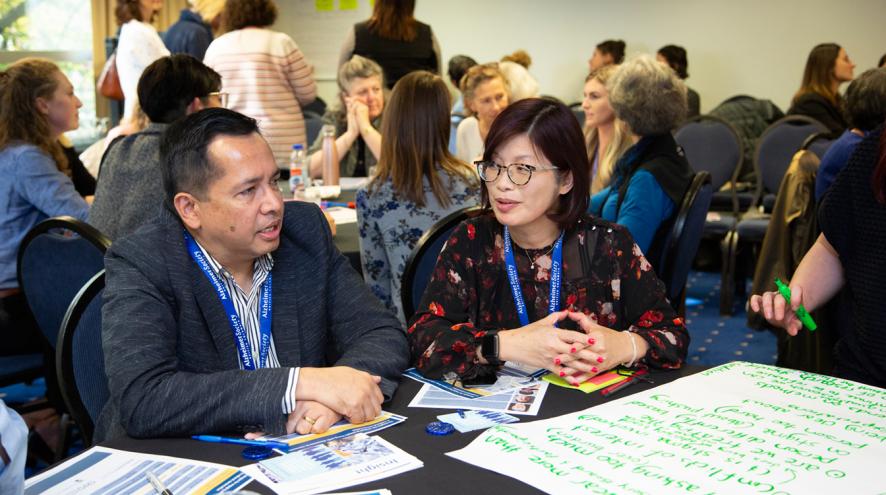Researchers in B.C.
Learn more about researchers in B.C. who are dedicated to improving the lives of people affected by dementia.

Researchers currently funded in B.C.
The Alzheimer Society of B.C. collaborates with provincial and national researchers by partnering with Michael Smith Health Research BC and contributing to the national Alzheimer Society Research Program.
2025 Michael Smith Health Research BC awardees
We recognize the importance of supporting researchers, especially in the early stages of their careers. Each year, we partner with Michael Smith Health Research BC, British Columbia’s health research agency, to co-fund successful applications from individual and team funding competitions.
Juanita-Dawne Bacsu
Thompson Rivers University
Scholar award: Improving wildfire supports of rural people with dementia and care partners in Interior British Columbia: Awareness, needs and mitigation strategies.
Wesam Farag
University of British Columbia
Trainee award: Targeting G protein-coupled receptors to improve neurovascular coupling in Alzheimer’s disease.
2025 Alzheimer Society Research Program awardees
The Alzheimer Society Research Program (ASRP) is a collaborative initiative between the provincial Alzheimer Societies, the Alzheimer Society of Canada, partners and our donors. In 2025, the ASRP is investing $5.1 million in 37 researchers and their projects across the country, representing a truly national commitment to advancing dementia research from coast to coast.
To date, 108 projects in British Columbia have received over $11 million in funding. Congratulations to the six incredible B.C.-based researchers awarded ASRP funding this year! Their dedication and innovation are paving the way for a brighter future in dementia care and research.
Douglas Allan
University of British Columbia
Proof of concept grant: A universal platform for high volume genetic modifier testing in Tauopathy.
Zoë Gilson
University of Victoria
Doctoral award: Psychoeducation to reduce risk of cognitive decline: Testing an mHealth intervention.
Veronica Hirsch-Reinshagen
University of British Columbia
Proof of concept grant: Deep histological and pathological phenotyping of sporadic dementia.
Lillian Hung
University of British Columbia
New investigator grant: A pilot randomized trial of a digital app, What Matters, to enable person-centred care.
Ryan Ripsman
University of British Columbia
Doctoral award: Finding the weakest link: Identifying cell subtypes with Alzheimer’s vulnerability in early-stage disease.
Kishore Seetharaman
Simon Fraser University
Postdoctoral award: Embedding dementia-inclusivity in built environment accessibility at the municipal level in Metro Vancouver: A universal design approach bridging aging, disability and dementia.
Other research projects in B.C.
We also partner with researchers and organizations to support effective and respectful dementia research by acting as collaborators and advisors on research projects, including the following:
DemSCAPE: This community-based research project engaged people living with dementia and their care partners in Metro Vancouver and Prince George to discover what barriers exist in their neighbourhoods and what improvements can be made through guidelines and knowledge mobilization tools for more dementia-inclusive communities.
- Habib Chaudhury, Simon Fraser University
- Learn more about this project here.
Flipping Stigma on its Ear Toolkit: The toolkit was designed by people living with dementia to help others – including other people living with dementia, the people who support them and researchers – to recognize and address the challenges of stigma and discrimination associated with dementia.
- Jim Mann, Deborah O’Connor and Alison Phinney, University of British Columbia
- Learn more about this project here.
IN THERE OUT HERE: Art Making Space to Live Well with Dementia: Showcases collaborative art made by people living with dementia and their care partners, academic researchers and art workshop facilitators in a series of multi-media art projects cultivating insightful discussions around what it means to live well with dementia to the end of life.
- Susan Cox and Gloria Puurveen, University of British Columbia
- Learn more about this project here.
More useful links and resources
To learn about dementia-friendly and inclusive research, find out about the biggest research stories of the past year, read our annual research publication, “Focus on research” – 2025 edition.
Do you have specific questions about research? Call us at 1-800-667-3742 or email [email protected].
